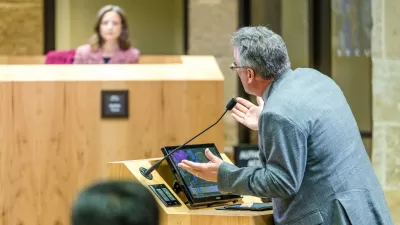Research in cognitive sciences is dictating that we can no longer rely on the presentation of scientific facts when building policy.

You're up there presenting to council the policy you just developed. You're confident in your baby: it's evidence-based, after all. You probably even wrote that in your report. You did your background research, accumulated and consolidated information. You poured over it and whittled down the data into tight policy statements. You completed what's considered the "problem-oriented approach" to writing policy. There was a gap, a problem. You resolved it. That's what your policy is based on. It's likely a failure.
Recently, a paper in the Policy Sciences journal used research in cognitive sciences to more fully understand the multifaceted nature of developing policy. The authors, Cairney and Weible, convey that the evidence-based approach to policy development does not consider the "too-messy link between cognitive and contextual explanations for action."
We've long understood that there's a limit to what we can research to develop policy. Only recently, state Cairney and Weible, have we begun to draw on social and organizational psychology to understand how emotions act as informational short cuts and coexist with cognition. We're learning the importance of group processes in leveraging emotional decision-making over rational thought.
A policy scientist analyzing the literature in her field of research may understand its various dimensions and produce recommendations based on it, but the myriad contexts, including her own (ir)rationality, in which the policy is contextualized cannot be fully considered. This should be expected. As Cairney and Weible state, "Our value orientations change following interactions with people who reinforce or challenge our beliefs." We frame our research and are led by those principles as we prioritize the goals of our research.
The authors continue: "A policymaker's environment consists of a myriad of actors and factors: multiple policymakers and influencers spread across levels and types of government; the formal and informal institutions that guide their actions at each level; the networks they form; the ideas of beliefs that dominate the ways in which they think about problems and solutions; the biophysical and socio-economic conditions to which they respond; and the events that offer opportunities and shocks."
What's the result? The authors suggest its tempting to assume we know what makes our audience tick, but policy operates in a context outside the influence of any one person; it's influenced by the crowd. There are many ticks. Thus there's a balance between the rational need of evidence and irrational reality of where decisions about policy are made. We should be making "good enough" decisions in our policy prescriptions. We don't need to seek a rationally perfect depiction of reality.
"If people engage emotionally with information, there is no way to appeal to all audiences with the same information." What are the lessons for developing policy? We're storytellers. Policy authors should tell a simple story with a clear moral, be trustworthy and consider the power structures of politics. We should accept that developing policy is ultimately an output of irrationality (read, political). It isn't an objective relay of evidence.
Ultimately, the authors conclude, "the choice is not whether or not to focus on skillful persuasion which appeals to emotion, but how to do it most effectively while adhering to key ethical principles. Generating trust in the messenger and knowing your audience may be more important to success than presenting evidence."

Planetizen Federal Action Tracker
A weekly monitor of how Trump’s orders and actions are impacting planners and planning in America.

Restaurant Patios Were a Pandemic Win — Why Were They so Hard to Keep?
Social distancing requirements and changes in travel patterns prompted cities to pilot new uses for street and sidewalk space. Then it got complicated.

Maui's Vacation Rental Debate Turns Ugly
Verbal attacks, misinformation campaigns and fistfights plague a high-stakes debate to convert thousands of vacation rentals into long-term housing.

In California Battle of Housing vs. Environment, Housing Just Won
A new state law significantly limits the power of CEQA, an environmental review law that served as a powerful tool for blocking new development.

Boulder Eliminates Parking Minimums Citywide
Officials estimate the cost of building a single underground parking space at up to $100,000.

Orange County, Florida Adopts Largest US “Sprawl Repair” Code
The ‘Orange Code’ seeks to rectify decades of sprawl-inducing, car-oriented development.
Urban Design for Planners 1: Software Tools
This six-course series explores essential urban design concepts using open source software and equips planners with the tools they need to participate fully in the urban design process.
Planning for Universal Design
Learn the tools for implementing Universal Design in planning regulations.
Heyer Gruel & Associates PA
JM Goldson LLC
Custer County Colorado
City of Camden Redevelopment Agency
City of Astoria
Transportation Research & Education Center (TREC) at Portland State University
Camden Redevelopment Agency
City of Claremont
Municipality of Princeton (NJ)






























